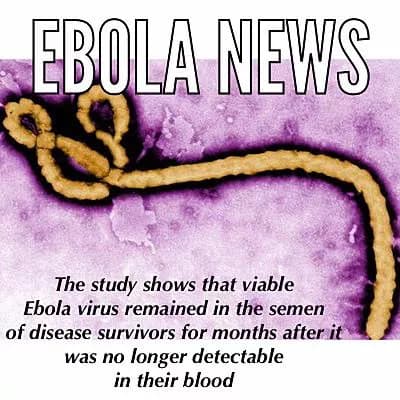
Sexual Transmission Of Ebola Likely To Impact Course Of Outbreaks
Sexual transmission of the Ebola virus could have a major impact on the dynamics of the disease, potentially reigniting an outbreak that has been contained by public health interventions, according to research by University of Georgia ecologists just published in the Royal Society journal Biology Letters.
The potential for sexual transmission is high for three to four months after the virus has been cleared from the bloodstream, and possible for an average of seven months.
The research was prompted by the publication of data showing that viable Ebola virus remained in the semen of disease survivors for months after it was no longer detectable in their blood -- and by a study reporting at least one instance of sexual transmission of Ebola.
"We realized that this could be a hidden source of the virus," said senior author Andrew Park, an associate professor in the UGA Odum School of Ecology and College of Veterinary Medicine's department of infectious diseases. "We wanted to find out what role sexual transmission might play in the dynamics of an outbreak."
The researchers developed a mathematical model to test various outbreak scenarios.
First, they created a model population of 1,000 individuals and introduced Ebola virus to track its spread via regular transmission. Based on the experience of the 2014 outbreak, they assumed that many actions would be taken, from individual behavior changes to public health interventions, to control the outbreak. In the parameterized model, this resulted in one in four individuals infected throughout the population.
"An important point to make is that without the behavior changes and interventions, it would have been more like 80 percent of individuals infected," said Park. "The actions taken in West Africa were very effective."
Next, they set out to determine the impact that sexual transmission could have.
"We wanted to know what it would mean in terms of the size of an outbreak, how long an outbreak lasts, how likely an outbreak is to occur and the reproductive ratio of the parasite, a measure of how effectively the parasite transmits in populations," said the study's lead author John Vinson, a doctoral student in the Odum School.
There were, however, two components of sexual transmission about which very little is known. The first is what proportion of people who survive Ebola are actually able to transmit the virus through sexual contact; the second is how the rate of sexual transmission compares to that of regular transmission.
To overcome this lack of data, they ran the model using values that varied widely for both questions but within plausible limits.
Their results showed a clear impact from sexual transmission. When the values of both parameters -- the number of sexually infectious individuals and the rate of transmission -- were low, outbreaks were smaller and ended more quickly, but as the values increased, so did the size and duration of outbreaks.
The model shows that even the smallest and shortest outbreaks in the presence of sexual transmission were larger and longer-lasting than outbreaks where no sexual transmission occurred.
"Whenever we had die-outs of the directly transmitted infectious individuals, which would otherwise have spelled the end of the outbreak, we had reignition from the sexually infectious individuals transmitting the virus to the susceptible people left in the population, who then served as a source of direct transmission," Vinson said. "Thinking about it from the parasite's point of view, the parasite is able to persist in that population even without the direct contact transmission by symptomatic individuals."
Park said the findings point to the importance of considering alternative pathways of disease transmission.
"There's an increasing awareness that sexual transmission can happen in addition to a more clearly evidenced transmission route and not just with Ebola," he said. "But there's been very little written about how it works or what it means for the metrics that the public health community uses. Our model is ultimately translatable to other disease systems and shows how it can be done even under uncertainty of key parameters."
The above post is reprinted from materials provided by University of Georgia. The original item was written by Beth Gavrilles. Note: Materials may be edited for content and length.
Disclaimer: DoveMed is not responsible for the adapted accuracy of news releases posted to DoveMed by contributing universities and institutions.
Primary Resource:
Vinson, J. E., Drake, J. M., Rohani, P., & Park, A. W. (2016). The potential for sexual transmission to compromise control of Ebola virus outbreaks.Biology Letters, 12(6), 20151079.
Related Articles
Test Your Knowledge
Asked by users
Related Centers
Related Specialties
Related Physicians
Related Procedures
Related Resources
Join DoveHubs
and connect with fellow professionals

0 Comments
Please log in to post a comment.